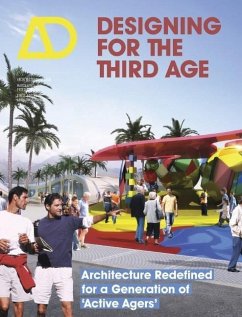Highlights how architecture needs to rise to the challenge of a demographic revolution
As people sixty-five and older constitute an ever increasingly proportion of population in most industrialized nations, the design of housing and other built provisions needs to be rethought in order to accommodate this ever-expanding ageing population. How can far-reaching architectural solutions play a key part by creating sustainable cities for the changing profile of the population, reducing models of dependency for care and transport while creating opportunities for recreation, leisure and work? This issue reflects on the population challenges facing Europe, Australia, North America, and Asia, offering innovative responses to these problems on a practical and speculative level.
Addresses a major social issue for architects, designers, and students
Includes contributions from Arup Global Foresight + Innovation; Baronness Greengross, President of the International Longevity Centre-UK; Matthias Hollwich of HWKN; Jerry Maltz of AIANY Design for Aging; David Birbeck of Design for Homes; Edward Denison, Research Associate at University College London; Kathryn Firth of the London Legacy Development Corporation; Richard Mazuch of IBI Nightingale; architect Walter Menteth; author Jayne Merkel; architect, writer and researcher Terri Peters; Anjali Raje, Executive Director of International Longevity Centre-India and architect Radhika Vaidya; Robert Schmidt of the Adaptable Futures research group at Loughborough University; Sally Stewart of Glasgow School of Architecture; Mark Taylor of The University of Newcastle; and Katherine Wilkinson of RMIT
Features architects including Amie Gross Architects, Ariktema, Dattner Architects, HWKN, Deborah Gans/Gans Studio, JJW Architects, Henning Larsen Architects, Michael Maltzan Architecture, nARCHITECTS, Nord Architects, PRP Architects, and Yanmin Zhou
As people sixty-five and older constitute an ever increasingly proportion of population in most industrialized nations, the design of housing and other built provisions needs to be rethought in order to accommodate this ever-expanding ageing population. How can far-reaching architectural solutions play a key part by creating sustainable cities for the changing profile of the population, reducing models of dependency for care and transport while creating opportunities for recreation, leisure and work? This issue reflects on the population challenges facing Europe, Australia, North America, and Asia, offering innovative responses to these problems on a practical and speculative level.
Addresses a major social issue for architects, designers, and students
Includes contributions from Arup Global Foresight + Innovation; Baronness Greengross, President of the International Longevity Centre-UK; Matthias Hollwich of HWKN; Jerry Maltz of AIANY Design for Aging; David Birbeck of Design for Homes; Edward Denison, Research Associate at University College London; Kathryn Firth of the London Legacy Development Corporation; Richard Mazuch of IBI Nightingale; architect Walter Menteth; author Jayne Merkel; architect, writer and researcher Terri Peters; Anjali Raje, Executive Director of International Longevity Centre-India and architect Radhika Vaidya; Robert Schmidt of the Adaptable Futures research group at Loughborough University; Sally Stewart of Glasgow School of Architecture; Mark Taylor of The University of Newcastle; and Katherine Wilkinson of RMIT
Features architects including Amie Gross Architects, Ariktema, Dattner Architects, HWKN, Deborah Gans/Gans Studio, JJW Architects, Henning Larsen Architects, Michael Maltzan Architecture, nARCHITECTS, Nord Architects, PRP Architects, and Yanmin Zhou








